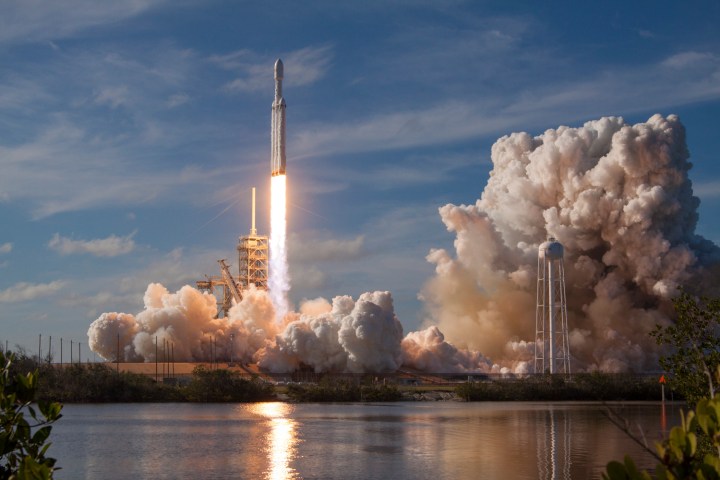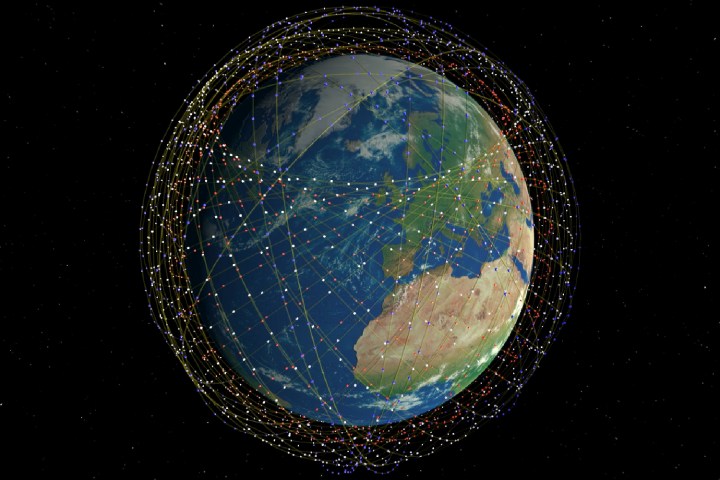
Like one of those comic book supervillain crossovers where The Joker meets Lex Luthor or Doctor Doom takes on Magneto, the world’s biggest tech companies are battling one another — with Earth as their ultimate prize.
That might sound a bit melodramatic, but it also sums up a recent trend by Silicon Valley companies looking to bring the internet to our planet’s furthest reaches by launching their very own internet satellites into orbit. Far from some obscure skunkworks project from companies with way too much money, however, these launches have the possibility to finally make the world the hyper-connected place that tech giants dream of.
At stake? The chance to connect every last person on the planet to the internet. Oh, and many, many billions of dollars, too.
Meet the contenders
Last summer, Facebook confirmed that it was looking to launch an in-house-developed satellite called Athena. This would bring broadband internet access to the world’s “unserved and underserved” developing communities. The proposed low Earth orbit satellite could launch a “limited duration” mission sometime in early 2019, following by a longer mission if the trial proves successful.

Elon Musk is at it, also. His company, SpaceX, has been dreaming of a “global broadband” system since 2015. Earlier this year, it launched the first two Starlink test satellites (named Tintin A and Tintin B) to prove that its concept is viable. Should these go according to plan, thousands more satellites will follow.
Google isn’t aiming quite so high (literally). However, its Project Loon initiative aims to use solar-powered balloons to beam internet to homes, businesses and personal devices in parts of the world lacking in broadband infrastructure. “It’s easiest to think of them as floating cellphone towers,” a Loon spokesperson previously told Digital Trends. “Loon works with mobile network operators to extend their networks to unconnected or under-connected communities.”
Now Amazon is getting in on the action as well. Last week, news emerged of its plans for Project Kuiper.
“Of course tech players want to help people with no internet access to have access, but that is not the real story.”
The Project Kuiper initiative would see the retail giant put 3,236 satellites into low-Earth orbit to, once again, provide internet access to communities lacking in such access at present. The filings were made with the International Telecommunication Union (ITU), an agency within the United Nations responsible for issues including satellite orbits.
There are other efforts we’ve not mentioned — with big names such as British entrepreneur Richard Branson backing them. It seems that, here in 2019, setting up a global broadband network is what “Harlem Shake” videos were a few years ago. If you’re not doing it, well, what the heck are you doing?
The next big tech battle
Tech companies love to talk a big game about changing the world. Steve Jobs, co-founder of Apple, talked about putting a ding in the universe — by building attractive, if expensive personal computers. Google doesn’t just build search engines; it wants to make the world’s information useful to everyone. For the longest time, it even cast its web-filtering algorithm in moral terms by using the motto “Don’t be evil” in its corporate code of conduct.
In almost every case, there’s a bit of sleight of hand going on, however. These are, after all, profit-generating companies with shareholders to answer to. Whether it’s
The same is doubtless true of bringing the internet to the world’s poorest, or most underserved, markets. “The satellite initiatives by the tech giants like Amazon, Facebook and Google is, for sure not, an initiative to do good only,” Spiros Margaris, a venture capitalist and tech industry observer, told Digital Trends. “Of course tech players want to help people with no internet access to have access, but that is not the real story. I think it is all about gaining new customers since with no internet there is, for instance, no Amazon B2C business.”
Bringing internet access to less-developed parts of the world is an enormous business opportunity for today’s tech giants
This is it, in a nutshell. Amazon, Google, Facebook and others have all defined the last decade or more of life online. For a long time, they didn’t butt heads too significantly. That’s changing, though. Whether it’s original video content, A.I. research, search, providing access to news stories and more, there are only so many ways these companies can keep growing without crossing over into one another’s business.
This satellite initiative is one more area to compete. With bold plans that call for thousands of new satellites being put into orbit and astronomical costs, it’s going to be fascinating to observe the next phase of the tech platform battle being fought not on our desktops or mobile devices in our pockets, but outside of Earth’s atmosphere.
Bridging the digital divide
But seeing satellites as just another zany tech research project is missing the point. The big goal of this project, the ultimate prize in all of this, is for the eyeballs of users all over the world. In a country like the U.S., virtually everyone has internet access. But only a little over half of the world’s population is online.

According to figures published earlier this month, 56.1% of the world’s population has internet access. In developing markets, this number is significantly lower. Africa is one market that is far behind on the “digital divide,” describing the haves and have-nots when it comes to modern digital technologies.
Bringing internet access to these parts of the world is an enormous business opportunity for today’s tech giants. In addition to providing the actual internet access services, it’s also the chance for Amazon, Facebook and others to expand their market beyond what is currently imaginable. It’s a race to bring tools and services like Google and Amazon Prime to every last person on the planet. While it’ll take several years to get there, the rewards are unimaginably large, even for companies that are used to dealing with millions of daily users and astronomical valuations.
To paraphrase Justin Timberlake’s Sean Parker in The Social Network: Your current user base isn’t cool. You know what’s cool? 7.53 billion users.
Editors' Recommendations
- How SpaceX could transform Starlink into an ultraprecise GPS network
- SpaceX will let you launch a satellite into space for as little as $1 million
- SpaceX launches 60 more Starlink internet satellites amid astronomer concerns
- Amazon bets big on its internet-from-space plan with major new facility
- SpaceX’s next resupply mission will deliver cannabis into orbit

